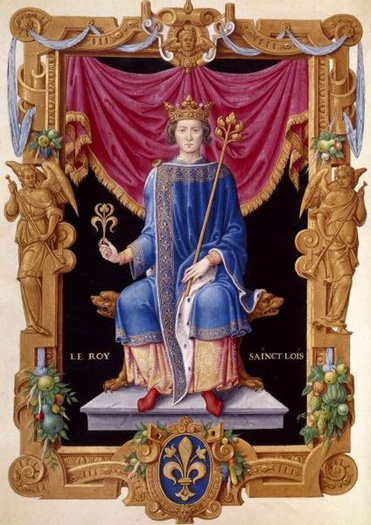 St. Louis, King of France by Father Francis Xavier Weninger, 1876
Louis IX., King of France, a perfect model of virtue to all princes, was born at Poissy, in 1215. Having early lost his father, Louis VIII., his mother, Blanche, a matron celebrated for her virtues and great mind, had him anointed king, when he was hardly twelve years old. Important reasons induced her to this step, although she remained regent during the king's minority. To this pious queen and mother St. Louis was greatly indebted for his piety; for, she led him in the path of true fidelity to God, knowing that the welfare of the whole land depended upon it. In the first years of his childhood she instilled into his mind the fear of the Lord and a great aversion for sin, by saying to him: "Beloved child, I would rather see thee in thine innocence fall dead at my feet, than that thou shouldst ever commit a mortal sin." These words Louis engraved so deeply into his heart, that he always abhorred sin more than all other evils, which is sufficiently illustrated by the fact that, according to the testimonials of his confessors, he never stained his soul with a mortal sin. The same fear he endeavored to impress upon others. One day, seeing a man afflicted with leprosy, he asked one of his courtiers whether he would rather suffer this disease or commit a mortal sin. The courtier having answered that he would rather have a hundred mortal sins on his soul than leprosy on his body, the holy king was indignant, and replied: "Truly, you do not understand what it means to be in disgrace with the Almighty. Learn that a mortal sin is more to be dreaded than all the evils on earth." Equal to his fear of sin was his zeal in performing good deeds and practicing Christian virtues. He daily attended holy Mass, and always with the greatest devotion, and he never suffered any levity at church, in his courtiers or domestics. He appointed certain hours during the day for prayers. The grace of holy baptism and of the Christian faith he esteemed more highly than his crown. To be a Christian was for him a higher title than to be king of France; hence he generally called himself Louis of Poissy, because he had been baptised in that city. His faith was so well established, that when he was one day informed that Christ was visible in the Blessed Eucharist, in the form of a lovely child, he answered: "I believe that Christ, our Lord, is present in the Blessed Eucharist, and so firm is this my belief, that I need not see Him with my eyes." 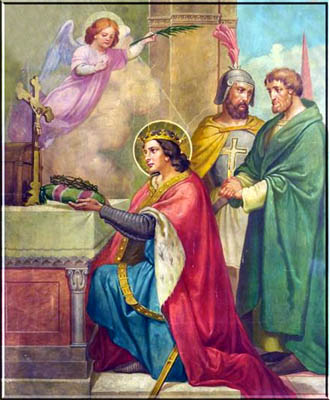 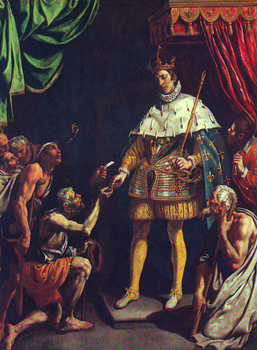 On another occasion, he said: "The poor must gain heaven by their patience, the rich, by giving alms." He built many asylums and other houses for the maintenance of the poor, and erected a still larger number of churches and convents for the honor of God and the salvation of souls. But as St. Louis thus proved himself a pious king, so also he showed himself a worthy ruler, by being indefatigable where the welfare of his people, or where justice and the protection of the church were concerned. He made laws and ordinances commanding all officials of the State to deal justice without any delay and to take all possible care of his subjects. Those who disobeyed these laws were severely punished. He appointed two days in the week on which everybody, even the lowest and poorest had free admittance to him and could bring him his complaints. He labored especially to uproot those vices which prevent the blessing of God, and call down the Divine wrath upon a land. Hence he ordained by law that blasphemers should be branded by the public executioner, and when, one day, his pardon was asked for a nobleman who had been guilty of this crime, the holy king refused it, saying: "I would let my own lips be pierced with a red hot iron, if, by this means, I could prevent all blasphemy in my domains."
On another occasion, he said: "The poor must gain heaven by their patience, the rich, by giving alms." He built many asylums and other houses for the maintenance of the poor, and erected a still larger number of churches and convents for the honor of God and the salvation of souls. But as St. Louis thus proved himself a pious king, so also he showed himself a worthy ruler, by being indefatigable where the welfare of his people, or where justice and the protection of the church were concerned. He made laws and ordinances commanding all officials of the State to deal justice without any delay and to take all possible care of his subjects. Those who disobeyed these laws were severely punished. He appointed two days in the week on which everybody, even the lowest and poorest had free admittance to him and could bring him his complaints. He labored especially to uproot those vices which prevent the blessing of God, and call down the Divine wrath upon a land. Hence he ordained by law that blasphemers should be branded by the public executioner, and when, one day, his pardon was asked for a nobleman who had been guilty of this crime, the holy king refused it, saying: "I would let my own lips be pierced with a red hot iron, if, by this means, I could prevent all blasphemy in my domains." His valor in war was as great as his zeal for justice and his endeavors to destroy all vice. The whole world had, in this pious and heroic king, a proof that piety and valor can well be united in the human heart. Over the Albigenses, the most bitter enemies of the State and Church, he gained a decisive victory, completely vanquishing them. Some rebellious subjects, who had made war against him when he first ascended the throne, and who were aided by a foreign power, were conquered and brought again under his sceptre. These and many other victories made him greatly esteemed and respected by all foreign monarchs. But nothing more effectually proves the great zeal of this holy king for the true church, than the crusades which he undertook to recover the Holy Land and to assist the oppressed Christians who lived in it. His first expedition, at the outset, promised great success, but in the course of time, by the inscrutable decrees of Providence, the greater part of his army fell victims to disease, and the holy king himself was taken prisoner. In this misfortune, his patience was so great and heroic, that even his enemies admired it. He submitted, without any complaint, to the Divine will, and continued his prayers, fasts and pious exercises, as if he were in his palace at Paris. He was at length released on payment of a ransom of 800,000 ducats, and the surrender of the cities he had taken. He thus concluded a truce of ten years with the Saracens. Having, under these conditions obtained his liberty, he remained some time longer in the Holy Land, visited with great devotion, the places made sacred by the presence of our Saviour, ransomed many prisoners, gave abundant alms, and fortified the few cities that remained in the hands of the Christians. Meanwhile the holy queen, Blanche, his mother, died at Paris, and when the news reached the Saint, he returned at once to France. Some years later, when it was reported that the Christians in the East were more oppressed than ever by the infidels, he resolved to undertake a second crusade to assist them. At first, success followed the king's army, but the great heat of the climate, the want of wholesome water and provisions, infected the whole army with an epidemic, so that a large number died, among whom was a son of the king. At last, St. Louis himself was seized with the disease, and without being disturbed by it, he prepared himself for his last hour by prayer and by devoutly receiving the holy Sacraments. After this he gave to the Crown Prince, who was with him, instructions, partly verbal, partly in writing, which were dictated by Christian and royal wisdom, and which will be given below. After this he desired to dispense with all worldly affairs, and to occupy himself only with God, to whose holy will he had entirely submitted. When his last hour had come, he desired to be robed in a penitential garment, and to be laid on a bed strewn with ashes. When this had been done, he took the Crucifix, kissed it most devoutly, and continued in prayer and acts of devotion, until he calmly expired, in the year of our Lord 1270, in the fifty-sixth year of his age. His last words were those of the Psalmist: "Lord, I will enter into Thy house: I will adore Thee in Thy holy temple, and will give glory to Thy name." Thus did St. Louis pass from a temporal into an eternal kingdom. Truly, he had been a great and holy king; great, on account of his valor in war; still greater, for his Christian magnanimity in adversity, but greatest, for the many exalted virtues by which he shone before the whole world from his childhood to the last hour of his life, and which prevented him from ever committing a mortal sin. 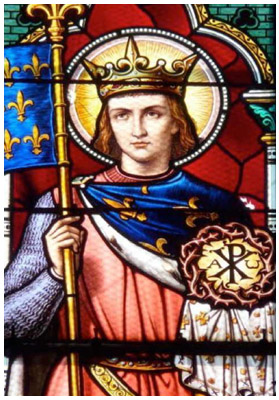
The instructions which he gave to the heir of his crown, and which he had constantly observed himself, testify his great holiness. They are as follows: 1. Love God, the Almighty, above everything. 2. Flee sin more quickly than you would a serpent. 3. Become not fainthearted in adversity. 4. Become not elevated in the days of prosperity. 5. Show the wounds of your soul frequently to your spiritual physician, and refuse no remedies, however bitter, to heal them. 6. Pray diligently. 7. Be compassionate and generous to the poor. 8. If your mind is harassed with doubt, consult a devout man. 9. Keep faithful and pious counsellors around you, and dismiss those who are wicked. 10. All that is good hold fast: all that is bad discard. 11. Lend a willing ear to those who speak of God. 12. Listen not to calumniators and slanderers. 13. So long as you reign, leave not unpunished those who blaspheme God and the Saints. 14. First be grateful to God, then to men. 15. Love and protect justice, and neither neglect nor despise the complaints of the needy. 16. In your own affairs, when they are not perfectly clear, speak and act against yourself. 17. Refund immediately the possessions of others. 18. Protect the clergy. 19. Love and honor your parents. 20. If you are obliged to war against Christians, spare the churches and the convents. 21. Endeavor to terminate all contentions with kindness. 22. Guard all your officials with a watchful eye. 23. Ever show due reverence to the Pope. 24. Overstep not the bounds of moderation in your expenses. 25. When I have departed, let prayers and Masses be said for the repose of my soul.
These were the last admonitions of the holy king.
How many glorious examples of the most noble virtues are to be found in the life of this admirable king! Consider them well and endeavor to imitate some of them; especially, his reverence in Church, his devotion in attending Holy Mass, his great esteem for the true faith, his firm belief in the presence of the Lord in the most Holy Sacrament, his continual zeal in prayer, his veneration for holy relics, his penance, his exactness in observing the fasts, his generous charity to the poor and prisoners, his zeal for the honor of God, manifested by the founding of Churches and convents, by the uprooting of vice, and by his protection of the true faith. Consider also his invincible patience in adversity, his perfect resignation to the Divine will, in the many unfortunate events of his life, and finally his holy preparation to leave this world. All these are examples which may serve to cover you with confusion, as well as to excite you to emulation. Of all these points, however, I will only place two more particularly before your eyes. PRACTICAL CONSIDERATIONS. I. "You do not understand what it is to be in disfavor with God. Learn that a mortal sin is more to be feared than all the evils of the world;" said the holy king. Recognize from this the perfect perception and horror that St. Louis had of sin. For this he was indebted to his holy mother, who had repeatedly said to him, that she would rather see him dead than polluted by a mortal sin; by which she desired to say, that sin was more to be feared than death. Oh! that all parents would impress this truth on the hearts of their children! But most people do not or will not comprehend the amount of wickedness that a single sin contains. And yet it is certain that sin is a greater evil than all others in this world; for, there is none that can so hurt us in soul and body as this. Should we lose nothing by sin but the friendship and favor of God, this alone ought to be sufficient to restrain us from committing it. Perhaps you do not regard this, because you do not understand what it is to be in disfavor with the Great God, or to have Him for an enemy. Surely, the greatest unhappiness of the damned is, that they have God as an enemy; for, this is the source of all their other misery. Why are you so little concerned about being in disgrace with God? Why do you draw His displeasure upon yourself so frivolously by committing great iniquities? Why do you remain in this state of disfavor so long, without any effort to reconcile yourself with God ? Pray fervently to the Almighty, to give you a right perception of the wickedness of sin, as this perception will soon be followed by hatred of it and by penance. II. In early youth the holy king was fond of hunting and fishing, and going to plays; but after his fifteenth year he refrained from these amusements, which he might have enjoyed without offending heaven, and sacrificed them to the Almighty. The holy Fathers regard the sacrifice which king David made to God, when he refused to appease his thirst with water that was brought to him from the cistern at Bethlehem, as more precious than many other sacrifices and victories with which this holy king had honored the Most High. Just so highly ought the act of St. Louis to be esteemed. He could have enjoyed these entertainments without sin; but he conquered himself, and, actuated by holy intentions, he refrained from them. In this manner, all true servants of God, all true penitents should act. They should not only refrain from unlawful pleasures, but also from such as are innocent, and thus offer to God a pleasing sacrifice. You have surely many opportunities, though perhaps only in small things, to make such sacrifices: do not let them pass without making use of them. You have more reason to do this than the holy king, as by committing sin you have sought and tasted unlawful pleasures. "Whoever remembers,'' says St. Gregory, "that he has tasted unlawful pleasures, should sometimes abstain from those permitted to him, in order to give, at least in part, satisfaction to his Creator." 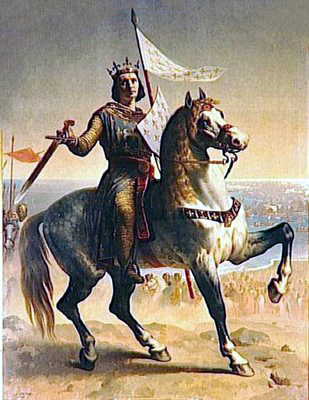 Litany of Saint Louis of France
Lord have mercy on us. Christ have mercy on us. Lord have mercy on us. Christ hear us. Christ, graciously hear us. God the Father of Heaven, Have mercy on us. God the Son, Redeemer of the world, Have mercy on us. God the Holy Ghost, Have mercy on us. Holy Trinity, one God, Have mercy on us. Holy Mary, Pray for us. * Holy Mother of God, * Holy Virgin of virgins, * Saint Louis of France, * St. Louis, scion of devout parents, * St. Louis, constant protector of the children of God, * St. Louis, steadfast teacher of piety, * St. Louis, true model of Christian virtue, * St. Louis, faithful confessor of the living Christ, * St. Louis, kingly bearer of humiliations, * St. Louis, staunch defender of the glorified Christ, * St. Louis, true martyr of the flesh by mortification, * St. Louis, detester of worldly pride and honor, * St. Louis, saviour of souls, * St. Louis, ardent lover of God, * St. Louis, kind friend of enemies, * St. Louis, rapt in prayer to God, * St. Louis, hope of sinners, * St. Louis, giver of gifts, * St. Louis, founder of charitable institutions for the afflicted, * St. Louis, generous giver of alms, * St. Louis, lavish dispenser of riches, * St. Louis, guard of the holy places of pilgrimage, * St. Louis, detester of immoderate people, * St Louis, protector of widows and orphans, * St. Louis, defender of the sepulchre of Our Lord Jesus Christ, * St. Louis, victor over the Saracens, * St. Louis, protector of those in pagan slavery, * St. Louis, converter of unbelievers to the Christian faith, * St. Louis, visitor of hospitals and dispenser of favors to the infirm, * St. Louis, healer of the sick, * St. Louis, intercessor and patron of the French King, * St. Louis, from whom those who flee to thee obtain the infallible help God, * St. Louis, at whose request divers diseases are miraculously cured, * Lamb of God, Who takest away the sins of the world: Spare us, O Lord. Lamb of God, Who takest away the sins of the world: Graciously hear us, O Lord. Lamb of God, Who takest away the sins of the world: Have mercy on us. Christ hear us. Christ, graciously hear us. Lord have mercy on us. Christ have mercy on us. Lord have mercy on us. Our Father (secretly). Hail, Mary (secretly). V. Pray for us, Saint Louis: R. That we may be made worthy of the promises of Christ. Let us pray: O Lord, King of kings, Jesus Christ, Who didst love Saint Louis and didst lead him into the heavenly Kingdom: grant that by his intercession and good works, we may participate in his glory for all eternity. Who livest and reignest world without end. Amen. http://catholicharboroffaithandmorals.com/ |